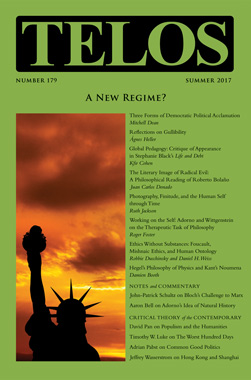Theresa May’s gamble to call an early election that would deliver a landslide victory badly backfired as the Conservative Party she leads for now ended up losing seats and now requires the support of the Democratic Unionist Party (DUP) of Northern Ireland to stay in power in a “hung parliament” where no party has an outright majority.
|
For many today, Claude Lefort is a thinker known mainly by association, someone whose work emerges where others are asked to situate their projects relative to his thinking of the political. He is a prominent, if not central, figure for the more post-structuralist thinkers of radical democracy. Lefort’s sense of democracy—as that form of society where the place of power is empty—is vital to those projects that would likewise tie democracy to the symbolic character of power, and to the distinct workings of politics and the political. Interestingly, while debate over the correct translation of le or la politique seems to almost always return to Lefort, it remains the case that for his own part Lefort was never much interested in post-structuralism. For him, the post-structural turn, itself bound up with the legacies of May 1968 and the new knowledge, obfuscated almost as much as it made clear. Assessing asymmetric wars in the abstract is a problematic task, even though most are “small wars” fought by “big nations.” Armed conflicts with these characteristics brim with persistent, undeclared, and low-intensity violence. It rarely is extinguished, and the lingering injuries sustain even more violence on the same scale. Many of these small wars began in Asia, Africa, Latin America, or the Middle East during, or not long after, World War II. Armed resistance there never completely ended; instead it intensified with decolonization and/or postcolonial state failure. Now virtually institutionalized in many violent wild zones around the world, low-intensity wars also flare up as asymmetric conflicts between rich countries and poor peoples, Westernized nations and anti-Western movements, liberal democratic states and illiberal theocratic insurgents after 1989. At the beginning of his 1961 study The Death of Tragedy, George Steiner claimed that Christian “optimism” contributed to the demise of tragic drama in modernity. The ensuing chapters of The Death of Tragedy actually offer a more nuanced account, though, in which Steiner finds tragic potential in the doctrine of original sin. In subsequent essays, Steiner has doubled down on his claim that tragedy must be bleak. Indeed, he now holds up an ideal of hopeless “absolute tragedy.” In these later writings, Steiner has also continued to show interest in original sin, even claiming in a 2004 essay that original sin is the core of tragic art. |
||||
|
Telos Press Publishing · PO Box 811 · Candor, NY 13743 · Phone: 212-228-6479 Privacy Policy · Data Protection Copyright © 2024 Telos Press Publishing · All Rights Reserved |
||||



